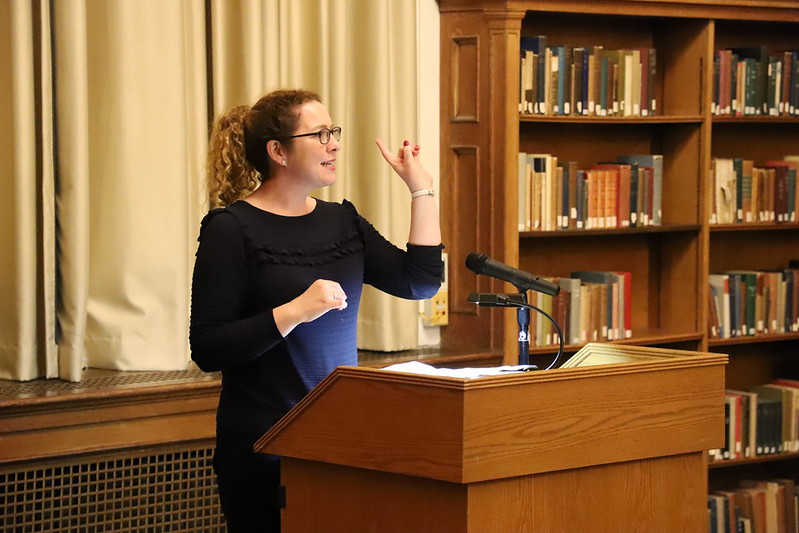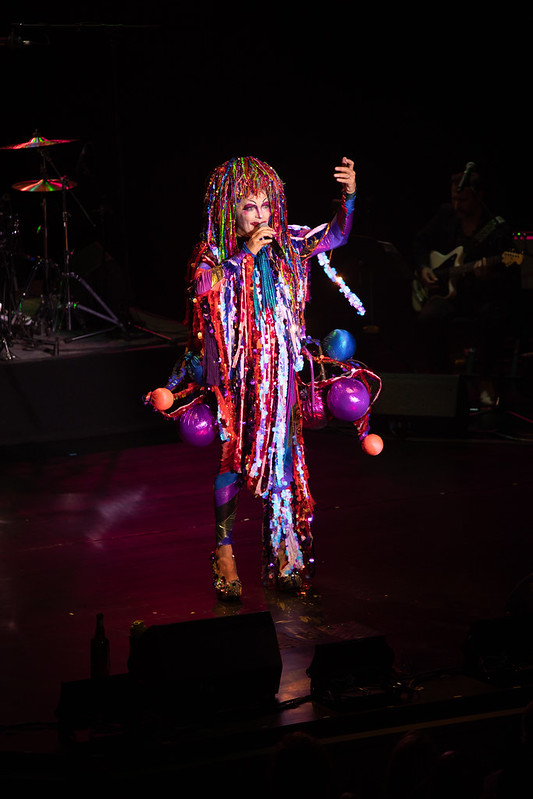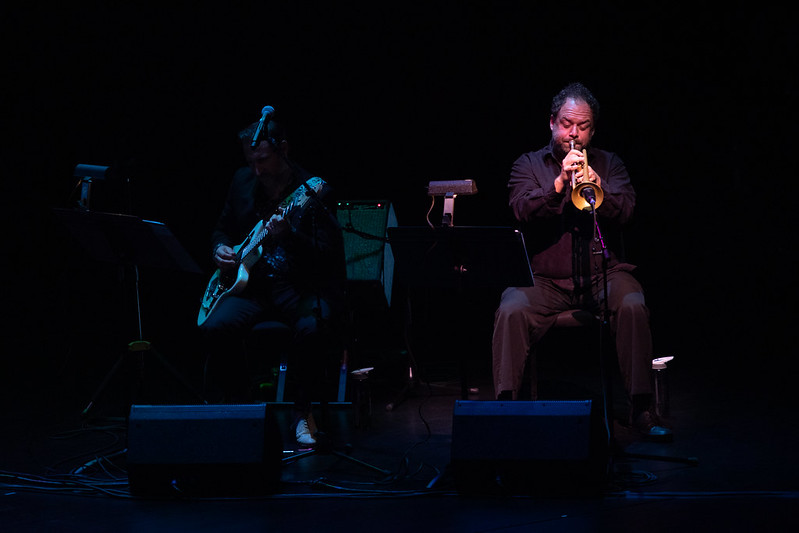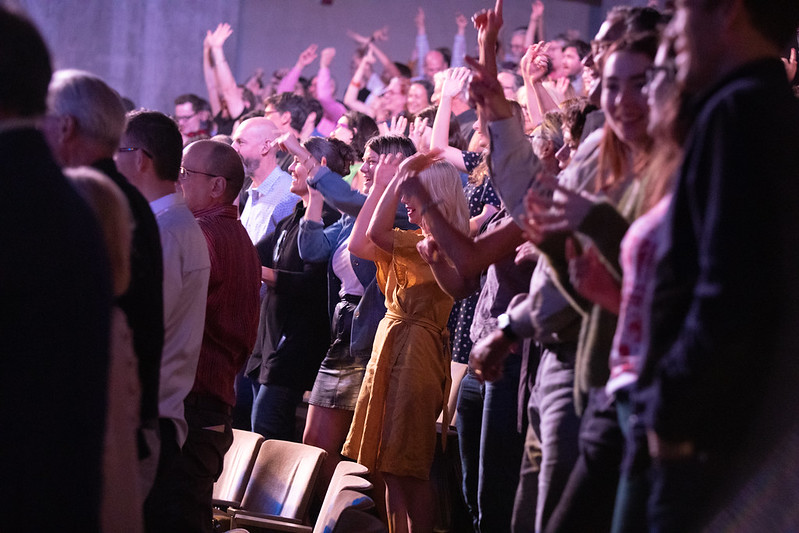
Dear Friends of the Center for the Arts,
This week, Sam Morreale ’19 (they/them) talks to Visiting Instructor of Theater Miranda Haymon ’16 (she/they) about directing the radio play “The Masses are Asses” (1974) by Pedro Pietri, which airs on Thursday, May 13 and Thursday, May 20, 2021 at 10pm on WESU Middletown 88.1FM. Each program will be available to stream from WESU’s show archives for two weeks following the broadcast. Morreale is currently helping to produce and curate the Theatre Communications Group 2021 virtual conference, “Our Theatre Ecology.”
All right, I truly have three questions and we can see if we need more as we go. They should be fairly easy; it’s all about The Masses are Asses. My first thought for you in this moment…[gets lost on their screen] oh my Goad, where are my notes. NOTES! The first is, is plain and simple. Can you describe the show? what is it, what is The Masses are Asses?
“The Masses are Asses” is paradoxical, satirical, poetic text that displays in plain sight the power of…the power of a…I don’t know just…I think what it does is that it gives us the satire of wealth and class and poverty in a way that really illuminates not just how much we value class when we’re thinking about the worth of a human in society, but also how much class predicates elements of ourselves that we do not yet know.
Um, I think that we see two characters in a world that is not so different from our own, but what develops over the course of about an hour or 70 minutes is frightening and disturbing and becomes – as the piece becomes more and more ridiculous – it becomes actually closer to our lived reality. And I just feel really excited to have worked on and to have found a play that so adequately and succinctly and brilliantly talks about the intersection between class and race and violence in America, and how they all intersect. So that’s The Masses are Asses. I don’t want to say too much because I don’t want to spoil it but I think that’s what it is, in a nutshell.
No, we have to leave them wanting more for sure! I think that’s a great, great job. I, personally, when I read the script I found it so timely, and particularly resonant with – it does a really beautiful thing with the absurdism. It is just so absurd, the whole – all of what the characters are experiencing and the world that they’ve created for themselves, and I think it does a great job of, you know, just showing the absurdity of our lived experiences to us.
Exactly.
I know you’re in residency at Wesleyan and this is a part of your greater artistic journey at the Center for the Arts, but what brought you to this specific script and project?
Actually it feels pretty full circle because this is a script that I discovered in my time at Wesleyan and as an undergrad. My friends and Daniel Maseda ’16 and Anthony Dean ’16 – [Assistant Professor of Theater, African American Studies, and Feminist, Gender, and Sexuality Studies] Katherine Brewer-Ball asked us if we’d be willing to just do a recording of it, you know, just to see what it was made out of and just for the opportunity for play. And I really latched on to not only the script, but also the audio version that we created. I actually performed in it as the Lady and Daniel was the Gentleman and Anthony did live sound cues of, you know, everything that happens in the world. So it was really fun and felt really active and I just have never gotten over this play. It always comes up! I always think about it. So when Wesleyan asked if there’s something that I wanted to do, especially given, you know what, piece – what kind of artistic process could we have that would exist virtually and still be significant, immediately I went to this play. In terms of thinking about my time at Wesleyan and projects that were still floating around. And also, I was a DJ for WESU at Wesleyan, so it was really exciting to work in the radio format and to revisit something that was so dear to me my junior and senior year, on campus. So that’s how I came to it. I have lots of dreams for it. I think that it’s the sort of text that doesn’t leave you. Um, and while I feel really proud and excited of the radio version we’ve made, I also feel excited about what else the play might have to teach us in other forms too so it feels like a really active play space from like a, an academic or a craft based place as well. Because it’s such a successful two hander! You really don’t get those; there’s not really a lot of successful two hands out there, so I’m glad to have had one and it really has served a lot of my thought processes about how to tell an impactful story, using satire and farce and ridiculousness and absurdity.
Yeah, that’s a perfect segue for my last question for you, which is about form. How has it been creating performance in a time of limited/no gathering, and what are the disadvantages and advantages that you found through the medium of the radio play? Like, what is serving you?
The disadvantages are that we’re not quite sure…because we do want it to exist on the radio, but not everyone has access to like a radio proper, especially not living in Connecticut. So we do have questions about, okay, what if folks are listening at their computer at home? What if folks are listening on the actual radio? What if folks are listening in headphones? Right? There’s not as much control of the audience experience, which I’m not used to because in theater and live performance you really do have that. Even when you’re working on commercials too, right? Like, you have a lot of agency over the user experience, over how the audience will receive the information, but with this we don’t have as much. You know, we don’t know if someone’s going to be driving, we don’t know if someone’s going to actually sit down and listen to it, we don’t know if someone’s just going to tune into it, you know, with 20 minutes left. Like, no clue how the work will be received. So that’s a disadvantage because it does feel…I want to create a piece that is accessible, which leads into one of the advantages, but sometimes when you don’t know how the audience is going to find the work that makes accessibility a lot more challenging. But that being said, part of one of the advantages to doing something like this is that anyone can listen from anywhere, at the given time. Right? So, we’re creating an audience that goes beyond just like, how many folks can we gather in this room? How many folks can travel to us? How many folks can pay for this? It really is, you know, if you log in, if you go to WESU 88.1FM at this time, like, you will have a piece to listen to. So that feels really exciting and I think that that also feels part of one of the advantages too. The fact that we’ve recorded this completely remotely. We had our sound team, Uptown Works – got to give them a shout out they are incredible. Excellent human beings, collaborators, technicians, designers – I mean, we really were able to activate these actors to create their own at home studio and learn how to you know change the gate and set up their mics and how far to be and how to set up sound blankets. And also you know giving them the opportunity to be able to just do it from their homes, and be wherever they were and I was doing it from my home and we had a technology that exists to be able to record remotely is…amazing. So I was really grateful to learn about that and now I want to do even more radio plays because it really is [amazing] – from like, in terms of costs and accessibility and how I feel like it activates the performers to be in control of their own performance, right? Being like yeah if you want to be close [to the mic] let’s try that! They really become engaged and enraptured in the process. So that was really bonding for us as an ensemble, and also was just really exciting for the future of audio and radio plays.
Yeah, there’s a kind of nostalgia I have for the radio play, and I think most people do. I have such fond memories of Sunday morning, sitting around in my living room with my siblings and my aunties and uncles and just like listening to a radio story…which is so weird, but I’m excited for that experience again when I listen to this.
No exactly! I mean, maybe off the record but you can use this if you want, like I’ve actually been thinking about…especially now that folks are getting vaccinated and it’s looking like you know gathering in groups of ten or fifteen, you know gathering in small groups will be a thing by the time the show comes out. So, Sam, I’ve been thinking about like, oh my gosh, how are we going to listen to this? Are people going to sit and listen to this thing for 80 minutes? But it’s actually kind of exciting! Because when I used to get an album, a new album, I would sit and listen to it as a kid, right? Like I would pick it up from Best Buy, I’d go home, I pop it in and I listen to it from beginning to end, no interruption. Or when I picked up, you know, a new book, right? I would go home and I’d sit and read it from front to back, and that was the experience. So I feel excited about introducing – reintroducing this kind of listening experience especially because it will just be occurring on these two times. And the ephemerality – the different kind of ephemerality that exists in that kind of accessibility.
Yeah that’s exactly what I was going to offer. Like, what you’re saying is that- it feels to me that that’s how you still find the liveness in this mode of performance and performance making, right? I keep considering like the difference between like theater, and like, how, how radio plays are still a type of theater. And it is the fact that like, you still set up a container for yourself to experience it where the event starts and the event ends and you have your own experience that will never be able to be created again in that moment. Which is pretty hot! I like that.
I think that’s totally true about the container and it just means that that container goes beyond Middletown, Connecticut, New York, the globe, everywhere! It goes far beyond that, but it is still a set time, and something that you know is an event taking place, which is how the theatricality remains.
I realized I lied when I said that was my last question for you, so I’m going to ask one more and then I promise I’ll respect this container.
Okay!
What lessons do you think you’ll be taking from this experience, and this mode into your future theater making practices?
I feel really excited about the opportunity to…I’m curious about how to integrate the notion of like takes? Because what’s so fun about having different takes is that you just play around a lot, and you make the choice later, you know? Like, the actors were like, “Can I try it like this and I just go completely insane?” and I was like, “Yes!” And then they’d be like, “Okay…can I just go super quiet?” and I was like, “Yes!” We already have two versions of it as we rehearsed, but why not just throw something else in there! And you know some of those takes we have, we ended up using or pulling from, or you know, learning about the overall narrative trajectory and tone and pacing from those more polar opposite takes. So, I think I want to take with me the opportunity to be able to really play and experiment and go to those extremes. I think sometimes in theater we become very precious and we become very focused on like, well, is this the best choice, as opposed to well let’s just open ourselves up to as many choices as possible. Maybe the choice that makes the most sense, we will find when we need to, as opposed to let it cement in now and all else comes from that. That feels exciting. I also feel excited about, and something that I learned is, maybe I will create audio experiences that run tangential to the plays that I create. Maybe not necessarily when I’m working with a playwright – maybe that’s something I would want to discuss – but I’m curious about…It was really exciting to adapt in a different form, especially since I do identify as an adapter, it was really awesome to talk about what was successful about the performance, the version of it that shouldn’t be performed in addition to the version of it that is purely an audio experience. Um, so I feel excited about having not said, “Okay it’s either the performance version, or it’s the radio version,” like having them go alongside each other. I mean frankly like the work that Audible Theater is doing, where they have plays that folks can come and enjoy in person and are fully staged, and then they release an audio version of it. Like, that’s awesome. I’m really thinking about that kind of collaboration, especially as we’re thinking about what does it mean to program a live season in addition to a digital season. I think that choosing plays that are active in both spheres could be really exciting to incorporate into my practice as a writer and a director and a producer in the future.
I love that. I’m always, I’m – it’s so exciting to hear you articulate those dreams, and I am overjoyed, as always, to be reminded of your very…you have a very abundant, generous, and magnanimous approach to the work that you do and like your generative and creative process, and I live for it. It makes me very excited to listen to The Masses are Asses on whatever day it is that I’m going to plug in this moment [Thursday, May 13 and Thursday, May 20, 2021 at 10pm on WESU Middletown 88.1FM. Each program will be available to stream from WESU’s show archives for two weeks following the broadcast.]
[Laughs]
Thank you so much for being in conversation with me and sharing your thoughts. I think we’ve done it!














